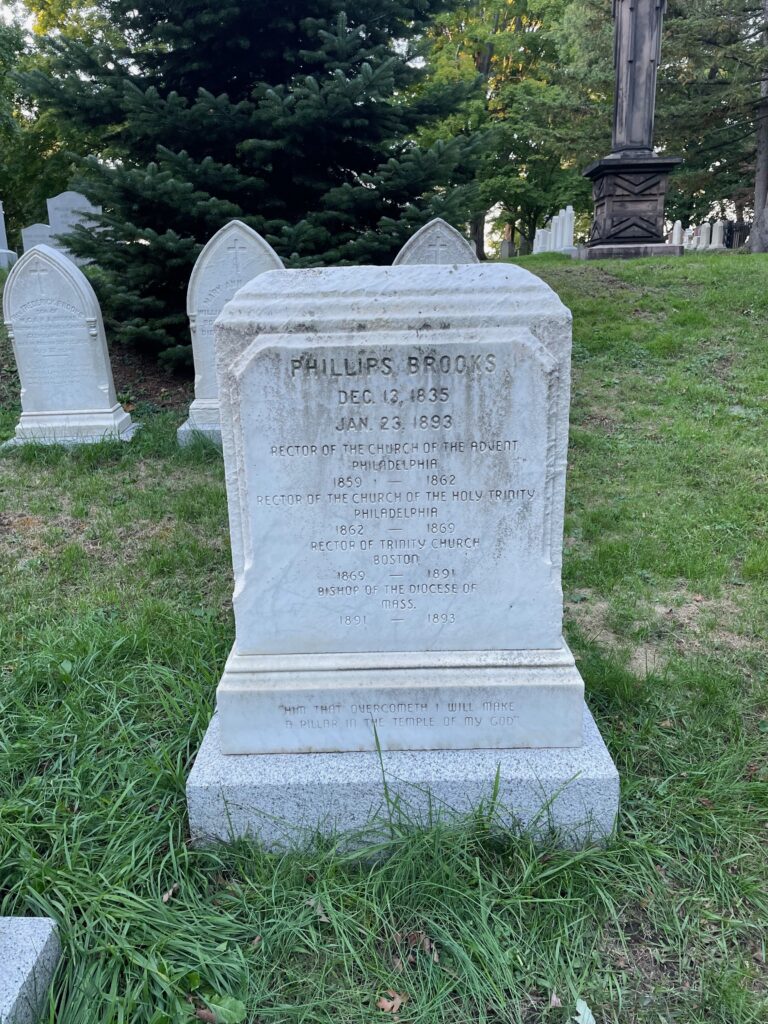Erik Visits an American Grave, Part 1,512
This is the grave of Phillips Brooks.

Born in 1835 in Boston, Brooks was a man of Boston. Good family that had been there forever, great-grandson of the founder of Phillips Academy. Brooks went to Boston Latin and then Harvard. He taught for awhile upon graduation but was so bad at it that he was fired. So he went down to Virginia and started to study for ordination as an Episcopal minister. Pretty high church for mid-19th century Boston! He went to Virginia Theological Seminary and graduated from there in 1859 with a divinity degree. He bought himself out of the Civil War it seems, but he was a very big supporter of Lincoln and emancipation. By the time the war started, he was at the Church of the Holy Trinity in Philadelphia. But he started getting famous for his Civil War speeches. In 1865, he gave two highly praised speeches, one of the death of Lincoln and another, while back at Harvard, about the significance of the war dead and the sacrifice they made to rejuvenate the republic.
In 1869, Boston came calling and he moved to Trinity Church there. It was under his leadership that the church designed its famous chapel with the very high end stained glass and murals. I am no expert on Protestant church architecture, other than noting that every Lutheran church seems to be a 1970s modernist architectural experimental building, but evidently this is a big deal in the circles who are into this kind of thing. In any case, he stayed at the church until 1891. But this whole time, he was also giving his speeches and doing a lot of writing. In short, he became one of the most important and influential ministers of the Gilded Age.
It’s a bit hard for me to express how central Brooks was to the Gilded Age elite in this country because the sermons don’t necessarily translate that well to today unless you do a lot of contextual work. But suffice it to say that he was the minister for the cultural elite of this time period. He was beloved, gave talks at Yale, Harvard, and other elite institutions basically whenever he wanted. He got honorary degrees from Yale, Columbia, and Oxford. He published several books of sermons.
Brooks also wrote the words “O Little Town of Bethlehem.” I did not intentionally put the author of that song on a grave post to celebrate Christmas. I didn’t know this until I started researching this post. But it’s a nice coincidence. In 1865, Brooks got to visit the Holy Land and that included Bethlehem of course. He was deeply moved and inspired. So he wrote this poem about it. His organist, Lewis Redner, wrote the music and they first performed it in 1868. Anyway, if this inspires you to go sing some Christmas carols, I guess that’s the kind of service the Internet’s Least Important Series provides America.
In 1891, Brooks was promoted to become Bishop of Massachusetts. But he died two years later, in 1893. He was 57 years old.
To get a sense of just how beloved Brooks was at the time, there is an almost insane number of buildings named for him, plus statues. There’s a statue on the North Andover Common. There’s a Phillips Brooks House on Harvard Yard. There’s a statue at Virginia Theological Seminary. There’s even an elementary school in California named for him. He’s almost totally forgotten today except by hard core Episcopalians (if such a thing even makes sense) but he really was a big freaking deal. He also had a massive funeral. One observer described it: “They buried him like a king. Harvard students carried his body on their shoulders. All barriers of denomination were down. Roman Catholics and Unitarians felt that a great man had fallen in Israel.” I think to truly get this, you have to more deeply ingrained into the world of late nineteenth century American religion than I am.
Phillips Brooks is buried in Mount Auburn Cemetery, Cambridge, Massachusetts. As if he could be buried anywhere else.
If you would like this series to visit writers of other Christmas carols, you can donate to cover the required expenses here. Maybe we can create an annual Christmas song writer day around here. Anyway, Johnny Marks, who wrote “Rudolph, the Red Nosed Reindeer” is in The Bronx and James Lord Pierpont, who wrote “Jingle Bells” shortly before committing treason in defense of slavery, is in Savannah, Georgia. Previous posts in this series are archived here and here.


